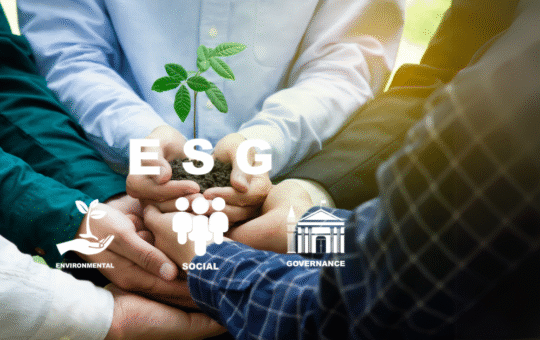
Level 4 Diploma in ESG and Sustainability Management
- Comprehensive Understanding of ESG: Gain an in-depth understanding of ESG management at an advanced level, learning how to implement sustainability initiatives across industries.
- Leadership Skills: Develop the leadership skills required to manage ESG projects, guide teams, and drive sustainable change in organizations.
- Practical Application: Learn how to implement ESG and sustainability strategies in business operations, ensuring alignment with global standards and regulatory frameworks.
- Career Advancement: Prepare for leadership roles in sustainability and ESG governance, expanding your career opportunities in the growing field of sustainable business practices.
- Expert Guidance: Learn from experienced professionals in the field of sustainability, providing you with expert knowledge and real-world insight into ESG management.
- Develop and Implement ESG Strategies: Create comprehensive ESG strategies aligned with global sustainability goals and frameworks such as the UN SDGs, GRI, and TCFD.
- Assess Sustainability Impact: Evaluate and assess the sustainability impact of business activities using a range of ESG metrics and standards.
- Manage Sustainability Projects: Effectively manage and lead ESG and sustainability initiatives, ensuring they are impactful, measurable, and compliant with global standards.
- Understand Global ESG Regulations: Gain knowledge of international ESG regulations and frameworks and apply them to develop corporate sustainability policies.
- Promote Corporate Responsibility: Lead initiatives that enhance corporate social responsibility (CSR) and environmental stewardship while balancing economic growth with social and environmental sustainability.
- Introduction to ESG and Sustainability
- Overview of ESG principles and their importance in business today.
- Key ESG frameworks and standards (GRI, SASB, TCFD, UN SDGs).
- The role of sustainability in modern business practices and governance.
- Sustainability Leadership and Governance
- The role of leadership in driving sustainability initiatives.
- Governance models for managing ESG risks and opportunities.
- Building an ESG framework within an organization.
- Creating and leading a sustainability-focused corporate culture.
- Environmental Sustainability and Climate Change
- Strategies for reducing carbon footprints and promoting energy efficiency.
- Climate change adaptation and mitigation strategies for businesses.
- Understanding the environmental regulations that affect ESG performance.
- Implementing sustainability practices to minimize environmental impact.
- Social Sustainability and Community Engagement
- Addressing social issues through corporate initiatives: health, diversity, and inclusion.
- Understanding social justice and community engagement within the framework of ESG.
- Developing policies that support human rights, fair labor practices, and social equity.
- Promoting ethical labor and improving social well-being.
- Governance and Ethical Practices in ESG
- The importance of governance in effective ESG implementation.
- Best practices for corporate governance and risk management in ESG.
- Building trust and transparency with stakeholders through robust governance structures.
- Managing corporate compliance and ethical business practices.
- ESG Reporting and Communication
- Techniques for communicating ESG initiatives to internal and external stakeholders.
- Best practices for ESG reporting and disclosures.
- Understanding the significance of transparent, accurate ESG reporting for stakeholders and regulators.
- The role of sustainability reporting in enhancing corporate reputation and stakeholder trust.
- Sustainable Business Practices and Strategy
- Developing and implementing business strategies that are sustainable and profitable.
- Integrating sustainability into the business model for long-term success.
- Understanding the financial implications of sustainability initiatives and their ROI.
- Strategies for embedding sustainability into the supply chain and operations.
- ESG Manager or Director
- Sustainability Consultant
- Corporate Social Responsibility (CSR) Manager
- Sustainability Reporting Manager
- Sustainability Program Director
- Environmental, Social, and Governance Consultant
- Comprehensive Curriculum: Gain a strategic, hands-on approach to managing ESG and sustainability efforts in various industries.
- Industry-Relevant Skills: Learn practical and actionable skills that can be immediately applied to real-world sustainability challenges.
- Expert Instruction: Benefit from insights and mentorship provided by industry professionals with extensive experience in sustainability and ESG management.
- Global Recognition: The Level 4 Diploma is recognized by employers worldwide, enhancing your career prospects and setting you up as a leader in ESG and sustainability.
- Flexible Learning: Study at your own pace, with access to online materials, resources, and support to help you succeed.
Study Units
- Introduction to ESG and Sustainability
- Overview of ESG principles and their importance in business today.
- Key ESG frameworks and standards (GRI, SASB, TCFD, UN SDGs).
- The role of sustainability in modern business practices and governance.
- Sustainability Leadership and Governance
- The role of leadership in driving sustainability initiatives.
- Governance models for managing ESG risks and opportunities.
- Building an ESG framework within an organization.
- Creating and leading a sustainability-focused corporate culture.
- Environmental Sustainability and Climate Change
- Strategies for reducing carbon footprints and promoting energy efficiency.
- Climate change adaptation and mitigation strategies for businesses.
- Understanding the environmental regulations that affect ESG performance.
- Implementing sustainability practices to minimize environmental impact.
- Social Sustainability and Community Engagement
- Addressing social issues through corporate initiatives: health, diversity, and inclusion.
- Understanding social justice and community engagement within the framework of ESG.
- Developing policies that support human rights, fair labor practices, and social equity.
- Promoting ethical labor and improving social well-being.
- Governance and Ethical Practices in ESG
- The importance of governance in effective ESG implementation.
- Best practices for corporate governance and risk management in ESG.
- Building trust and transparency with stakeholders through robust governance structures.
- Managing corporate compliance and ethical business practices.
- ESG Reporting and Communication
- Techniques for communicating ESG initiatives to internal and external stakeholders.
- Best practices for ESG reporting and disclosures.
- Understanding the significance of transparent, accurate ESG reporting for stakeholders and regulators.
- The role of sustainability reporting in enhancing corporate reputation and stakeholder trust.
- Sustainable Business Practices and Strategy
- Developing and implementing business strategies that are sustainable and profitable.
- Integrating sustainability into the business model for long-term success.
- Understanding the financial implications of sustainability initiatives and their ROI.
- Strategies for embedding sustainability into the supply chain and operations.
Upon successful completion of this course, learners will be able to:
- Develop and Implement ESG Strategies: Create comprehensive ESG strategies aligned with global sustainability goals and frameworks such as the UN SDGs, GRI, and TCFD.
- Assess Sustainability Impact: Evaluate and assess the sustainability impact of business activities using a range of ESG metrics and standards.
- Manage Sustainability Projects: Effectively manage and lead ESG and sustainability initiatives, ensuring they are impactful, measurable, and compliant with global standards.
- Understand Global ESG Regulations: Gain knowledge of international ESG regulations and frameworks and apply them to develop corporate sustainability policies.
- Promote Corporate Responsibility: Lead initiatives that enhance corporate social responsibility (CSR) and environmental stewardship while balancing economic growth with social and environmental sustainability.
The Level 4 Diploma in ESG and Sustainability Management is designed for professionals aiming to advance their careers by specializing in Environmental, Social, and Governance (ESG) management and sustainability initiatives. This qualification is ideal for those in or aspiring to roles where they will lead, develop, or implement sustainability programs and ESG strategies across various sectors. This course is particularly suited for:
ESG Managers and Directors
Professionals currently in or seeking to move into leadership roles in ESG management, looking to deepen their expertise in sustainability governance, reporting, and strategy development.
Sustainability Consultants
Consultants advising businesses on sustainability, ESG issues, and corporate responsibility, who want to gain a more strategic understanding of the principles and applications of ESG in business.
Corporate Social Responsibility (CSR) Managers
Professionals responsible for leading CSR initiatives, looking to enhance their understanding of ESG as a holistic approach to corporate social responsibility and sustainability.
Environmental, Social, and Governance (ESG) Analysts
Individuals focused on analyzing and reporting ESG data, who wish to gain expertise in integrating sustainability into business strategy and operations for improved reporting and corporate performance.
Sustainability Program Directors
Leaders in charge of managing large-scale sustainability programs or projects within their organizations, aiming to broaden their knowledge of governance, sustainability metrics, and ESG risk management.
Environmental Managers
Managers overseeing environmental sustainability practices in their organizations, seeking to improve their approach to integrating environmental concerns with broader business goals.
Corporate Governance Professionals
Individuals working in governance or risk management roles who want to understand how to incorporate ESG principles into corporate governance frameworks for improved transparency and risk mitigation.
Business Strategists
Professionals involved in developing and executing business strategies who need to understand how to incorporate sustainability into long-term corporate goals for both financial and environmental benefit.
Ethical Business Leaders
Business owners or senior managers who are committed to enhancing their company’s ethical standards, social responsibility, and environmental stewardship, and who need strategic skills for fostering sustainable business growth.
Our assessment process is designed to ensure every learner achieves the required level of knowledge, skills, and understanding outlined in each course unit.
Purpose of Assessment
Assessment helps measure how well a learner has met the learning outcomes. It ensures consistency, quality, and fairness across all learners.
What Learners Need to Do
Learners must provide clear evidence that shows they have met all the learning outcomes and assessment criteria for each unit. This evidence can take different forms depending on the course and type of learning.
Types of Acceptable Evidence
Assignments, reports, or projects
Worksheets or written tasks
Portfolios of practical work
Answers to oral or written questions
Test or exam papers
Understanding the Structure
Learning outcomes explain what learners should know, understand, or be able to do.
Assessment criteria set the standard learners must meet to achieve each learning outcome.
Assessment Guidelines
All assessment must be authentic, current, and relevant to the unit.
Evidence must match each assessment criterion clearly.
Plagiarism or copied work is not accepted.
All learners must complete assessments within the given timelines.
Where applicable, assessments may be reviewed or verified by internal or external quality assurers.
Full learning outcomes and assessment criteria for each qualification are available from page 8 of the course handbook.
Top Courses
Related Courses
Let's Get in touch
Deleting Course Review
Course Access
This course is password protected. To access it please enter your password below:



